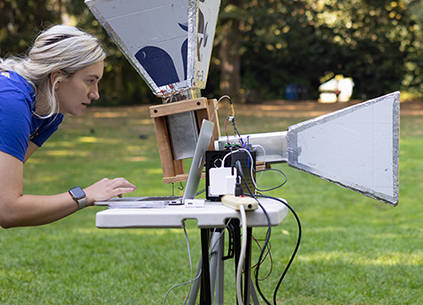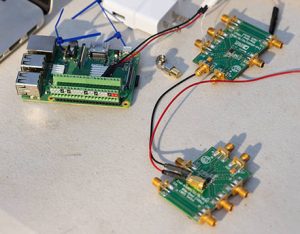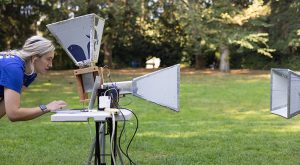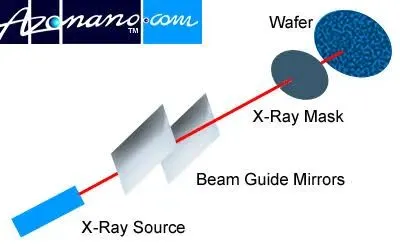
One of the prototypes
5bit/s was sent over ~7.3m with a bit error rate of 0.15%, and 20bit/s over ~6.1m at <1% error rate.
“What is really exciting is that this is a completely new way to communicate,” said Washington researcher Joshua Smith. “We send information by controlling some thermal noise within the transmitter. When this noise is connected to the transmit antenna, the receiver sees a larger output signal, when it is disconnected the receiver sees a smaller signal.”
How the scheme works is described in a paper and an article linked below. The key, it seems, is that despite being at the same thermal temperature, the noise temperature of the receiver is lower that the transmitter and is therefore thermally ‘down hill’.
With the proof-of-concept – in which the switch at the transmit end is powered – the team went to great lengths to eliminate alternative causes for the data flow that they were measuring, and also demonstrated transmission by switching between a 50Ω load at room temperature and another in liquid nitrogen.
“I think this is the first step,” said fellow researcher Zerina Kapetanovic (left). “There are other forms of noise that exist in nature, so you could take this work further and perhaps find other noise sources you could use to communicate with.”
The experimental antennas set operation at around 1.4GHz, matching the two LNAs and intervening bandpass filter at the receiver.
“We selected 1.4GHz because this is the frequency at which neutral hydrogen in the galaxy emits, and radio astronomers often look at this, so LNAs, bandpass filters and antenna designs are readily available.” There is nothing in the physics that ties Johnson noise communication to a specific frequency or bandwidth, “so this could be done wide-band, and increasing the bandwidth could in principle improve performance”, he continued.
The clearly-written paper ‘Communication by means of modulated Johnson noise‘ in the Proceedings of the National Academy of Sciences is the formal publication of this work, and for those still scratching their heads, there is ‘Device transmits radio waves with almost no power – without violating the laws of physics‘ in The Conversation.








